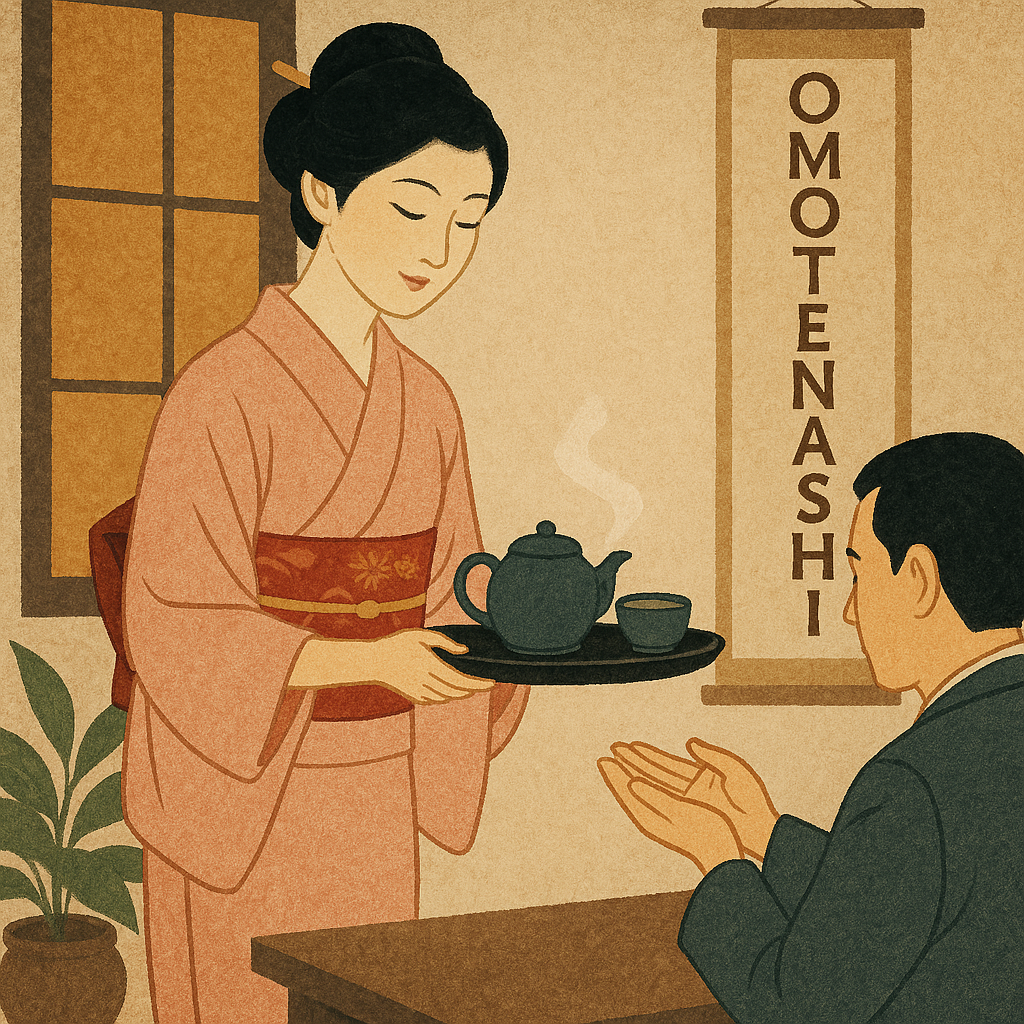In a world increasingly dominated by mechanized efficiency and automated interactions, a remarkable philosophy flourishes in the heart of Japan. This philosophy, known as Omotenashi, beautifully bridges cultural heritage and genuine human connection, ensuring that each interaction is more than a simple transaction. Omotenashi, at its core, isn’t simply about serving tea or handing over a menu; it is an intricate blend of emotional intelligence and cultural pride, masterfully sculpted over centuries. Have you ever pondered what transforms an ordinary meal into a cherished memory?
Understanding Omotenashi: More than a Concept
The Definition of Omotenashi
Omotenashi transcends being a mere term; it embodies an ethos that encapsulates the very soul of Japanese hospitality. It weaves together respect, admiration, and foresight, nurturing an environment where guests feel genuinely appreciated and cared for. But how does this uniquely Japanese approach influence hospitality? Omotenashi seamlessly ingrains itself in every encounter, fostering an environment of unparalleled sincerity and warmth. The commitment to anticipating and addressing guest needs without overt acknowledgment distinguishes Omotenashi, ensuring each guest departs with a profound sense of care and attention.
The Ancient Roots of Omotenashi: Shinto, Buddhism, and Guest Reverence
Venturing into the origins of Japanese hospitality illuminates a rich mosaic embroidered with threads of Shinto and Buddhist traditions. These faiths emphasize harmony, respect, and compassion, principles that naturally seep into hospitality practices. Historically, Japanese culture has revered the act of welcoming guests. Ritualistic and ceremonial aspects of Shinto and Buddhist practices have profoundly shaped this mindset. For centuries, from offering tea to humble acts of kindness, hospitality served as a spiritual reflection of gratitude and selflessness, elements that remain deeply embedded in Japanese cultural consciousness even today.
The 4 Pillars of Omotenashi: Creating Unforgettable Guest Experiences
Anticipation of Needs
In the realm of Omotenashi, the subtle art of anticipating a guest’s needs stands paramount. This intuitive skill involves discerning unspoken requests, ensuring guests feel seamlessly looked after. From offering a cushion without asking to serving a meal precisely when a guest appears ready to eat, the anticipation of needs becomes an invisible yet formidable presence that enriches every experience.
Attention to Detail
Omotenashi thrives on attention to detail, where craftsmanship and perfectionism converge to produce exemplary service. Every action and element, from the careful arrangement of a dish to the ambiance of a room, aligns to complement the guest’s experience. Precision and care transform everyday interactions into works of art, demonstrating a commitment to aesthetics and functionality.
Genuine Care
Embedded within Omotenashi is the compassionate connection between host and guest. This empathy-driven approach ensures that every interaction fosters a profound sense of belonging and respect. Genuine care transcends mere formality, where hosts regard guests as extensions of their family, seeking to provide comfort and joy.
Cultural Rituals and Practices
A hallmark of Omotenashi is its reverence for cultural rituals and practices. The traditional tea ceremony, for instance, epitomizes this philosophy, encapsulating grace, precision, and an unwavering commitment to the guest’s experience. Each element, from the utensil arrangement to the meticulous preparation of tea, crafts a serene and immersive encounter, highlighting the profound dedication to Omotenashi.
How Omotenashi Shapes Everyday Interactions
Experiencing Omotenashi in Japanese Restaurants
Dining in Japan offers a captivating exhibit of Omotenashi, where even the most straightforward meal awakens the senses to nuanced expressions of hospitality. From the precise arrangement of chopsticks to the artful placement of each dish, dining becomes an orchestrated experience that elevates gastronomy into an immersion of culture. Gestures such as offering a hot towel (oshibori) on arrival exemplify the fundamental principles of Omotenashi, underscoring a shared space of respect and consideration.
Omotenashi in Hotels: The Role of Hospitality Staff
In Japanese hotels, Omotenashi guides every facet of the guest experience. Hospitality staff, revered as custodians of this tradition, embody an unwavering dedication to service excellence. Their attentiveness to detail, from seamlessly managing guest preferences to ensuring spotless surroundings, transforms moments of stay into cherished memories. This degree of attention culminates in luxury experiences where guest satisfaction is paramount and unwavering.
Outdoor Events and Festivals: Cultural Values and Festive Atmospheres
Japanese outdoor events and festivals beautifully showcase how Omotenashi extends beyond confined spaces into public celebrations. These gatherings echo the community’s cultural values and traditions while enabling locals and tourists alike to partake in a richly woven tapestry of experiences. The communal atmosphere fosters deep engagement, drawing visitors into a world of shared joy and celebration where everyone feels welcome and valued.
Omotenashi’s Influence on Global Hospitality
Lessons for International Businesses
As international businesses strive to elevate customer experiences, the principles of Omotenashi offer invaluable lessons in creating genuine connections and enhancing service. By adopting strategies that prioritize empathy and foresight, organizations can transform ordinary transactions into unforgettable engagements that resonate with cultures worldwide. The timeless tenets of Omotenashi — respect, harmony, and anticipation — possess a universal applicability that transcends geographical boundaries.
Case Studies: Successful Global Brands Adopting Omotenashi
Organizations such as the global luxury brand Ritz-Carlton have successfully integrated Omotenashi’s principles into their hospitality strategies. These brands emphasize personalized service, prioritizing the individual needs of each guest. By fostering environments where empathy leads service delivery, they create emotionally resonant experiences that reflect the core values of Omotenashi, resulting in heightened customer loyalty and satisfaction.
The Role of Technology in Modern Omotenashi
Balancing Tradition with Innovation
The harmonization of technology with traditional Omotenashi presents an exciting frontier within modern hospitality. Innovations such as AI-driven customer relationship management advance service through personalized interactions, effectively enhancing the Omotenashi experience. These tools empower hosts to anticipate guest needs with precision and efficacy, blending tradition with technological prowess.
Challenges in Maintaining Genuine Hospitality
However, the delicate interplay between efficiency and human touch poses significant challenges. While technology enhances operational ease, it can inadvertently overshadow the genuine warmth Omotenashi cherishes. Striking a balance that retains personal engagement amid technological advancement becomes crucial, ensuring that the essence of Omotenashi endures.
Conclusion: Embracing Omotenashi in Everyday Life
How to Practice Omotenashi Personally
Embracing Omotenashi in personal spheres enriches both domestic and professional interactions. Simple gestures such as listening attentively, showing appreciation, and anticipating the needs of others cultivate a nurturing environment characterized by respect and empathy. Integrating these values into everyday life fosters intimacy and understanding, promoting deeper connections with those around us.
Final Thoughts on the Cultural Significance of Hospitality
Omotenashi remains a significant reflection of Japanese cultural values, a lighthouse of empathy, and respect in an increasingly interconnected world. By prioritizing human connection over transactional encounters, Omotenashi reveals a path to enriching divine hospitality experiences globally, inviting us to reflect on our interactions and the lingering impact of genuine care.
Frequently Asked Questions about Omotenashi
What is the origin of Omotenashi?
Omotenashi stems from ancient Japanese customs deeply influenced by Shinto and Buddhist principles of harmony and reverence for guests.
How can I experience true Omotenashi in Japan?
To experience authentic Omotenashi, immerse yourself in cultural activities such as attending a traditional tea ceremony or dining at local establishments.
In what ways does Omotenashi differ from Western hospitality?
While Western hospitality often emphasizes efficiency and convenience, Omotenashi focuses on emotional connection, anticipating needs, and personalized care.
How do the Japanese view customer service?
Customer service in Japan reflects a commitment to excellence, prioritizing sincerity, empathy, and dedication.
Are there specific customs to follow when accepting hospitality in Japan?
When accepting hospitality, it is customary to show gratitude by expressing appreciation, respecting local norms, and reciprocating kindness.


